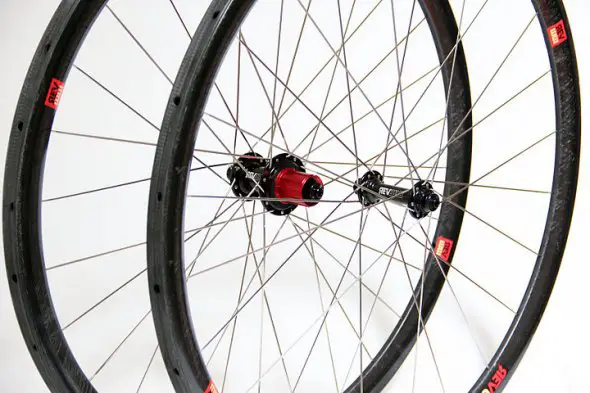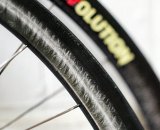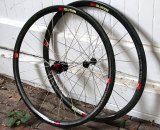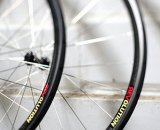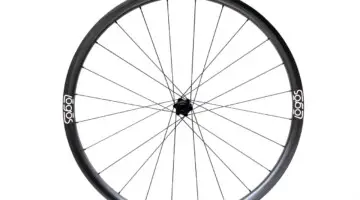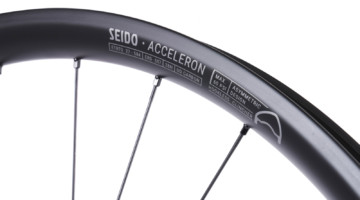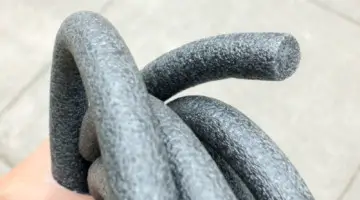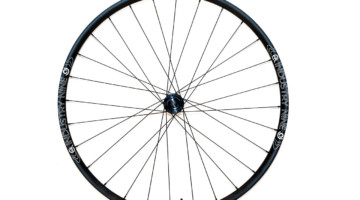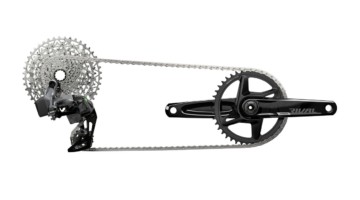Most serious cyclocrossers eventually move from clinchers to tubular tires (or tubeless) to take advantage of the faster speeds of low-pressure tires with less pinch flat risk. Serious cyclocrossers who can afford it often look to carbon rims for weight savings. Now cyclocross racers are increasingly seeking wider rims for better tire support. Revolution Wheelworks puts these three elements together in their new Rev-33X carbon tubular wheelset. Dan Seaton beat up these wheels in a season-long test for Cyclocross Magazine.
by Dan Seaton
I spent most of the 2010-11 cyclocross season testing Revolution Wheelworks Rev-33X wheels, a carbon-rimmed tubular wheel that strikes an impressive balance between weight, handling and price. And not only did I test these wheels, I tested them in Belgium, throwing every kind of condition I could find at them: pavement, grass, dirt, sand, smooth and rough terrain and, of course, about ten different flavors of mud.
Each wheel features a 33mm deep, 23mm wide, 330 gram rim. The Rev-33X’s rim goes wide for cyclocross, just as we’ve seen with other cyclocross-targeted wheels, like the Cole T24 and T45 cyclocross wheels , the Zipp 303 Cyclocross wheelset, and recent wheels from Rolf Prima. The theory on wider rims is that they offer more tire support and gluing surface for cyclocross, and potentially better aerodynamics on the road.
The Revolution Wheelworks Rev-33X’s finish is difficult to describe, but is a glossy carbon finish that stands out and definitely attracts attention. (In fact, one of my criticisms of the test wheelset is that they featured Revolution’s stock decals, done in a matte black that didn’t really match or show off the flashy treatment the rims have, but Revolution says they are working on clear decals.) The finish layer, though it looks cool, is purely cosmetic. The real structural elements are hidden below. Revolution uses a 3k weave at the rim edge where the nipples seat and at the tire bed, for strength and impact resistance. The rim walls are constructed from unidirectional carbon, while the brake surface has a separate layer that Revolution says is “optimized for the forces that are applied to it.”
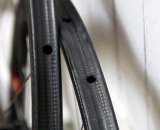
The Rev-33x rims are 23mm wide to better support a wider cyclocross tubular. photo: courtesy Revolution Wheelworks
The carbon layup for the rims is done in Taiwan, and the wheels are build by hand in Revolution’s small shop in the US. One of the biggest improvements over past Revolution offerings for ’cross is that the relatively wide rims used in the Rev-33X make it possible to run lower tire pressures without the sloppy handling you can encounter if the tire starts to roll over off the rim. In fact, I compared these new rims to the narrower ones on Revolution’s deep-section wheel, the Rev-50X (the very set we reviewed in Issue 6) and found that I could get away with almost five PSI less pressure on the Rev-33X before handling really went south. On Belgian-style courses, which are frequently very rough and just as frequently slick and muddy, the lower pressures meant much improved steering, traction, and rolling resistance in the worst conditions. I occasionally ran these wheels with tire pressures below 20 psi without encountering any trouble, and the tire remained securely glued (and was glued so well it was a bear to remove at the end of the season).
Another big advantage the wheelset offers is its very low weight. With RevWW-branded hubs (also from Taiwan) weighing in at a claimed 82g in front and 236g in the back, along with Sapim’s CX-Ray spokes (24/28 front/rear), the whole wheelset weighs only 1210 g. That’s a full 300g (more than half a pound) less than Revolution’s alloy-based Rev-25X ’cross tubulars, and 200g less than the Rev-50X (and nearly as light as the popular but much more expensive Zipp 303 tubular wheelset). The wheels felt snappy when accelerating out of tight turns and my bikes were noticeably easier to shoulder on steep, muddy run-ups when sporting those wheels than with heavier options.
Despite their light weight, the wheels proved surprisingly robust. I tortured them in some truly miserable conditions, sprayed them down with power-washers, and hit more than my fair share of mid-race rocks and curbs with them. But the rims stayed essentially true, and the hubs proved a cinch to service when it was necessary with just a pair of Allen wrenches. The aluminum freehub body tends to get chewed up by cassettes over time, but it is easy to remove and replace when necessary, and the clever internal design avoids some of the pitfalls—like tiny springs that tend to pop out and get lost during service—of other freehub bodies I have seen. The only conditions in which the Rev-33X really faltered for me was in the deep, soupy mud common in races in West Flanders. Deep mud can flow over the relatively shallow rims and bog down the bike. Compared to the deeper Rev-50X, which I felt shed the sloppiest mud better, it was a little harder to handle the Rev-33Xs when conditions get really nasty (See our revolutionary and surprising test of deep-section rims’ mud-shedding and tracking ability in Issue 13). But for all except the most extreme conditions, I felt that the wider rim profile allows the tires to float better though moderate mud than their deep-section cousins, canceling out any real disadvantage in most situations.
Carbon rims have a reputation for poor braking performance, especially when wet. But Revolution uses a basalt-coated braking surface on their wheels and includes a set of SwissStop’s Yellow King carbon brake pads with all of their carbon wheelsets. Armed with those excellent pads and a carefully adjusted brakeset (see our power tests and setup tips in Issue 14), stopping performance was excellent. The bike slowed reliably in almost all conditions, and I experienced virtually none of the squealing that’s often synonymous with ’cross brakes. I did test the wheels with TRPs standard carbon-specific pads, and found with these pads, my brake performance was compromised a bit more than with the SwissStop pads.
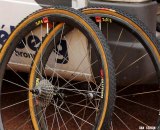
Jeff Bahnson raced the Rev-33x wheeslet last season, including at the World Championships. © Dan Seaton
My only real complaint about the wheels is that their hidden spoke nipples make even minor truing adjustments rather complicated. Revolution says that the hidden nipples make for a stronger rim, and it certainly yields a cleaner overall appearance. Other companies, like Rolf Prima, also utilize hidden-nipple construction as well. However, it’s impossible to adjust the wheel without special spoke wrenches and, more to the point, without removing the tire from the rim. For Revolution’s sponsored elite racers who use these wheels, Valentin Scherz and Jeff Bahnson, among others, swapping adjustability for strength is a good trade. But for racers without a full-time mechanical support system, this could mean big chunks of time invested to fix relatively minor truing problems.
On the other hand, the wheels I tested proved so durable that, even without any truing adjustments for an entire season, they kept rolling almost as straight as when they were brand new. In general, the wheelset’s performance and price more than offset the minor inconvenience of this singular drawback. Revolution, a direct-to-consumer operation located just outside of Philadelphia, hand-builds all their wheels in a small, dedicated wheel shop. Because of this, consumers can talk directly with the builders (primarily co-founder and cyclocross enthusiast Jonathan Kahler) if problems arise or if they have special requests when purchasing wheels. For consumers who are interested in this level of personal customer service, Revolution might be an attractive option.
All in all, for a racer looking to elevate his or her game with an elite level tubular wheelset, it would be hard to beat the value for money that the World Championship-tested Rev-33X offers at $1260, just over half as much as comparable wheelsets from Zipp and ENVE Composites. The Rev-33X is on sale now, available by contacting Revolution Wheelworks directly. Look for them to appear officially on the Revolution Wheelworks website sometime this winter.
Revolution Wheelworks Rev-33X Carbon Tubular Wheelset
MSRP: $1260
Rim: 33mm deep, 23mm wide, 330 gram carbon tubular rim with internal nipple beds
Hubs: Revolution Wheelworks hubs, 84g front, 234g rear, alloy freehub body, sealed cartridge bearings
Spokes: Sapim CX-Ray, 24 front, 28 rear, 1x spoke lacing front and rear
Weight: 1210 grams (list, without skewers). Skewers approximately 90 grams per set.
For more info: www.revolutionwheelworks.com













